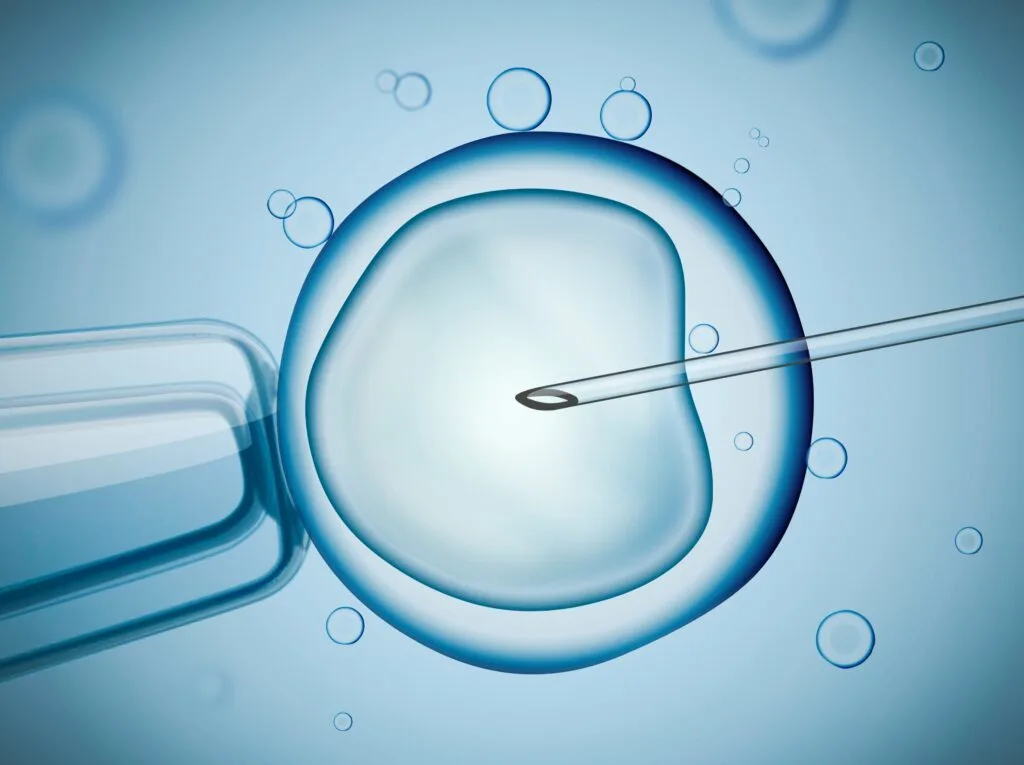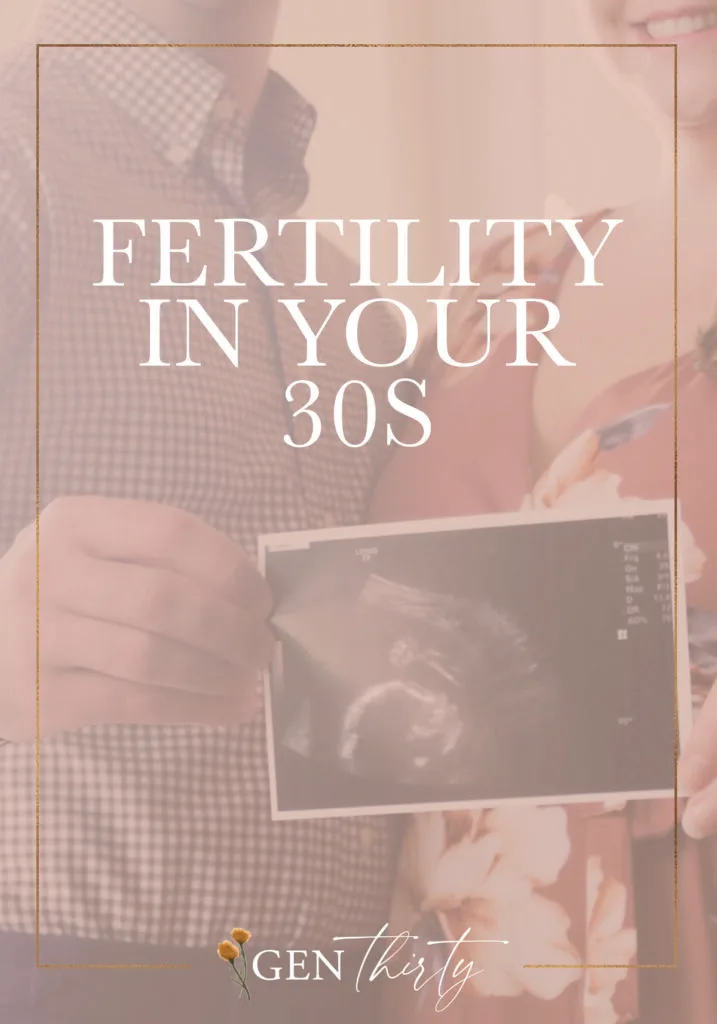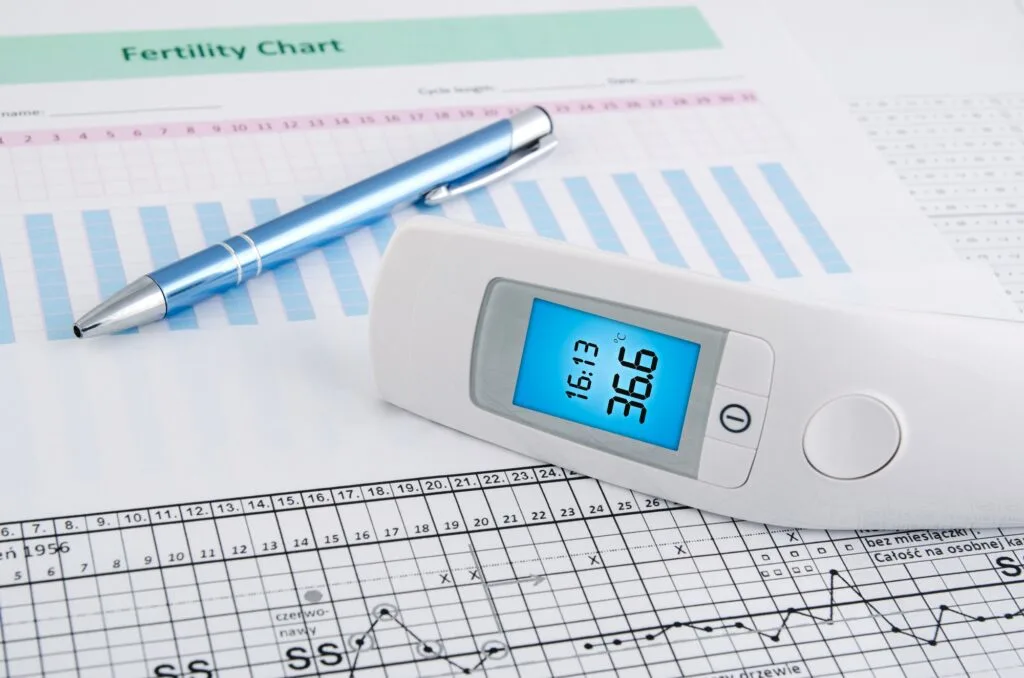Every woman in her 30s will have some questions about her fertility at some point.
You might be thinking about starting a family, or perhaps you already have your first child and want to add more children. Maybe you’re not ready for parenthood yet, but you just want to know what your options are for the future.
Whatever your situation, fertility is a very important topic that you simply cannot ignore especially as you grow older.
There are many factors that affect a woman’s fertility, including her age, lifestyle, genetics, and medical history.
As you get older, your fertility naturally declines. This is because your eggs decrease in number and quality over time.
The decline is gradual at first, but it speeds up in your 30s. This means that it might take longer to get pregnant, and you might have a higher risk of miscarriage or complications.

But just because your fertility declines does not mean all is lost. That said, getting pregnant in your 30s is still possible and very common. Getting pregnant in your 30s and older is still very possible.
Studies show that more women are having babies in their 30s than ever before. Younger women have a plethora of reasons to not start a family in their 20s.
What’s more, there are now more ways than ever before to boost your fertility and improve your chances of having a healthy pregnancy.
If you need some help navigating all this, you have come to the right place. In this article, we’ll cover everything you need to know about fertility in your 30s.
Whether you’re ready to conceive now or later, this guide should help you make informed decisions about your fertility and empower you to achieve your family goals.
Let’s get started!

Understanding Female Fertility in Your 30s
One of the main factors that affect your fertility is your age. As you get older, your fertility naturally declines due to normal, age-related changes that occur in your ovaries.
Men continue to produce sperm throughout their lives. On the other hand, women are born with all the egg-containing follicles in their ovaries that they will ever have.
At birth, you have about one million follicles. By puberty, you have about 300,000–500,000. By age 37, you have about 25,000. The number of eggs in your ovaries decreases with age until you reach menopause when you have no more follicles left.
As you have fewer and fewer follicles, your fertility is affected in two ways.
First, it reduces the chances of ovulation and conception. Second, it reduces the quality of the eggs that are left.
Older eggs are more likely to have chromosomal abnormalities that can lead to miscarriage or birth defects.
So how does this affect your chances of getting pregnant?
On average, a woman in her 30s has a 15 to 20 percent chance of getting pregnant each month. This will gradually decline over the next decade, especially after you turn 35. By age 40, your chances of getting pregnant each month are around 7 percent.
Age also increases the risk of complications during pregnancy and delivery. Older women are more likely to have medical conditions such as diabetes and high blood pressure that can affect their health and their baby’s health.
They are also more likely to experience problems such as ectopic pregnancy, placenta previa, preeclampsia, gestational diabetes, and more.

Factors Affecting Fertility in Your 30s:
Besides age, there are several other factors that can impact your fertility in your 30s.
Some of these factors are within your control, while others are not. Let’s take a look at each one.
- Smoking: Smoking can damage your eggs, reduce your ovarian reserve, and increase your risk of miscarriage and ectopic pregnancy. If you have a partner that smokes, it can also affect their sperm quality and quantity.
- Alcohol: Drinking alcohol can interfere with ovulation, hormone balance, and implantation. Alcohol can also affect sperm production and motility. Excessive alcohol consumption can increase the risk of birth defects and fetal alcohol syndrome.
- Weight: Being overweight or underweight can affect your fertility by causing hormonal imbalances, irregular periods, ovulation problems, and lower pregnancy rates.
- Exercise: Moderate exercise can benefit your fertility by improving blood flow, reducing stress, and regulating body weight. Just don’t overdo it as too intense exercise can disrupt your menstrual cycle, ovulation, and hormone levels.
- Stress: Stress can affect your fertility by altering your brain chemistry, hormone production, and ovulation. Stress can also affect your libido, mood, and relationship with your partner.
- Diet: What you eat can affect your fertility by influencing your hormone levels, egg quality, ovulation, and implantation. A balanced diet that includes plenty of fruits, vegetables, whole grains, lean proteins, healthy fats, and water can provide you with the nutrients you need for optimal fertility.
Medical Factors That Affect Fertility
There are also many medical conditions that can affect your fertility in your 30s. Some of these are:
- Endometriosis: Endometriosis is a condition where the tissue that normally lines the inside of the uterus grows outside the uterus. This can cause inflammation, scarring, adhesions, and blockages in the pelvic organs. Endometriosis can affect your fertility by impairing ovulation, egg quality, fertilization, implantation, or tubal function.
- Polycystic ovary syndrome (PCOS): PCOS is a hormonal disorder that causes enlarged ovaries with multiple small cysts. PCOS can affect your fertility by causing irregular periods and also by causing pain during sex or menstruation.
- Fibroids: Fibroids are benign (noncancerous) growths in the uterus. They can affect your fertility by changing the shape of the uterus, blocking the fallopian tubes, or interfering with implantation.
- Thyroid problems: Thyroid problems such as hypothyroidism (underactive thyroid) or hyperthyroidism (overactive thyroid) can affect your fertility by disrupting your menstrual cycle, ovulation, and hormone balance.

Options For PreservingFertility in Your 30s
If you are not ready to have a baby in your early 30s, but you want to keep your options open for the future, you may consider preserving your fertility for a fertility treatment for your late 30s and beyond.
This means saving and storing your eggs, sperm, or embryos for later use. It’s a good idea to do this to leave your options open.
There are several different options available for preserving your fertility thanks to reproductive medicine. Each of these has its own pros and cons. Let’s take a look at them:
Egg Freezing
Egg freezing is a process that involves stimulating your ovaries with hormones to produce multiple eggs, retrieving them from your ovaries with a needle, and freezing them in a laboratory.
The frozen eggs can be stored for several years until you decide to use them. When you are ready to get pregnant, the eggs are thawed, fertilized with sperm in a lab (in vitro fertilization or IVF), and transferred to your uterus.
Pros:
- It allows you to use your own eggs when you are older, which may increase your chances of having a healthy baby.
- It gives you more control over your reproductive choices and timing.
- Egg freezing can be done at any time of your menstrual cycle.
Cons:
- It is expensive and usually not covered by insurance.
- Egg freezing does not guarantee a pregnancy or a live birth. The success rate depends on many factors, such as your age, egg quality, sperm quality, and embryo quality.
- It involves hormonal stimulation and egg retrieval, which can have side effects and risks

Fertility Medications
Fertility medications are drugs that stimulate your ovaries to produce more eggs or regulate your ovulation.
They can be taken orally or injected. They can be used alone or in combination with other fertility treatments such as intrauterine insemination (IUI) or IVF.
Pros:
- Fertility medications can increase your chances of getting pregnant naturally or with assisted reproductive technologies.
- They can help treat some causes of infertility such as ovulation problems, PCOS, or endometriosis.
- They are relatively easy to use and less invasive than surgery.
Cons:
- Some fertility medications can have adverse side effects such as mood swings, headaches, nausea, bloating, or breast tenderness.
- They can increase the risk of multiple pregnancies (twins or more), which can lead to complications such as preterm birth, low birth weight, or preeclampsia.
- Fertility medications can also cause OHSS, which is a serious condition that causes swelling of the ovaries and fluid buildup in the abdomen or chest.

Fertility Treatments
Fertility treatments are procedures that help you get pregnant with medical assistance. They include IUI and IVF.
IUI is a process that involves placing sperm directly into your uterus around the time of ovulation.
IVF is a process that involves fertilizing your eggs with sperm in a lab and transferring one or more embryos to your uterus.
Pros:
- They can help you get pregnant if you have infertility issues
- Fertility treatments can use your own eggs and sperm or donor eggs and sperm if needed.
- Fertility treatments can also allow you to screen the embryos for genetic abnormalities (preimplantation genetic testing) before transferring them to your uterus.
Cons:
- Fertility treatments are expensive and usually not covered by insurance.
- They do not guarantee a pregnancy or a live birth.
- Fertility treatments involve hormonal stimulation and procedures, which can have side effects and risks such as OHSS, bleeding, infection, or damage to the ovaries or other organs.
Ovarian Tissue Freezing
Ovarian tissue freezing is a process that involves removing one or both of your ovaries with surgery, cutting them into thin slices, and freezing them in a laboratory.
The frozen ovarian tissue can be stored for years until you decide to use it. When you are ready to get pregnant, the ovarian tissue is thawed and transplanted back into your body or into another person’s body.
Pros:
- Ovarian tissue freezing allows you to use your own eggs when you are older, which may increase your chances of having a healthy baby.
- It can restore your natural hormone production and prevent early menopause.
- It can be done at any time of your menstrual cycle and does not require hormonal stimulation.
Cons:
- Ovarian tissue freezing is an experimental technique that is not widely available or regulated.
- It is expensive and usually not covered by insurance.
- Ovarian tissue freezing involves surgery, which can have complications such as bleeding, infection, or damage to the organs or blood vessels.
Embryo Freezing
To freeze embryos, eggs are stimulated with hormones, retrieved with a needle, fertilized with sperm in a lab using the in vitro fertilization (IVF) method, and then frozen in a laboratory.
The frozen embryos can be stored for years until you decide to use them. When you are ready to get pregnant, the embryos are thawed and transferred to your uterus.
Pros:
- Embryo freezing allows you to use your own eggs and sperm or donor eggs and sperm when you are older, which may increase your chances of having a healthy baby.
- It gives you more control over your reproductive choices and timing.
- It allows you to screen the embryos for genetic abnormalities
Cons:
- Embryo freezing is expensive and usually not covered by insurance.
- It does not guarantee a pregnancy or a live birth.

Sperm Freezing
Sperm freezing is a process that involves collecting a semen sample from a man, analyzing it for sperm quality and quantity, and freezing it in a laboratory.
The frozen sperm can be stored for years until it is needed for fertilization. When the sperm is needed, it is thawed and used for IUI or IVF.
Pros:
- Sperm freezing allows a man to preserve his fertility before undergoing medical treatments that may affect his sperm production or quality
- It allows a man to donate his sperm to someone who needs it for conception
- It also allows a man to have more flexibility over his reproductive choices and timing.
Cons:
- It is expensive and usually not covered by insurance. The cost may include semen analysis, storage fees, and IUI or IVF.
- Sperm freezing does not guarantee a pregnancy or a live birth.
- It involves collecting a semen sample, which can be uncomfortable or inconvenient for some men.
Donor Eggs
Donor eggs are eggs that are donated by another woman who has undergone ovarian stimulation and egg retrieval.
The donor eggs can be fresh or frozen. The donor eggs are fertilized with sperm from the intended father or a sperm donor in a lab (IVF) and transferred to the uterus of the intended mother or a surrogate.
Pros:
- Donor eggs allow a woman who cannot use her own eggs to have a baby with her partner’s sperm or donor sperm.
- Donor eggs have higher success rates than using one’s own eggs after a certain age.
- It is possible to screen the embryos for genetic abnormalities
Cons:
- Donor eggs are expensive and usually not covered by insurance.
- They involve ethical and emotional issues such as finding a suitable donor, disclosing the use of donor eggs to others, and coping with potential feelings of loss or guilt.
- Donor eggs may also involve legal issues. For example, common issues include establishing parental rights and responsibilities, obtaining informed consent from all parties involved, and complying with state laws and regulations.
Other Options
Besides preserving your fertility or using assisted reproductive technologies, there are other options for people who want to have children in their 30s or later.
These include:
- Adoption: This is a process that involves legally taking care of another person’s child as your own. It can be domestic or international, open or closed, public or private. Adoption can provide a loving home for children who need one and fulfill your desire to be a parent at the same time.
- Foster care: Foster care is a temporary arrangement that involves taking care of a child who has been removed from their birth family due to abuse, neglect, or other reasons. It can be short-term or long-term depending on the child’s situation and needs. As a foster parent, you will be able to provide a safe and nurturing home for children who need one and support their reunification with their birth family or their adoption by another family.
- Co-parenting: This is a practice that involves sharing the nurturing of a child, usually a foster child, with the birth parents. Co-parenting can help maintain the child’s connection with their birth family and prepare them for reunification or adoption. Through co-parenting, you will also be able to learn more about the child’s background, preferences, and needs.
- Surrogacy: This is a process that involves hiring another woman to carry and deliver a baby for you. Surrogacy can be gestational (using your own eggs and sperm or donor eggs and sperm) or traditional (using the surrogate’s eggs and your partner’s sperm or donor sperm). It can provide a way for you to have a biological child if you cannot carry a pregnancy yourself due to medical reasons.

Tips For Optimizing Fertility in Your 30s
Here are some helpful tips for optimizing your fertility in your 30s:
- Limit alcohol and caffeine. You don’t have to give up your favorite drinks completely, but moderation is key.
- Eat an overall healthy diet. What you eat can influence your hormonal balance, egg quality, and uterine lining. Aim for a balanced diet that includes plenty of fruits, vegetables, whole grains, lean protein, and healthy fats.
- Start taking prenatal vitamins. Even before you get pregnant, taking a prenatal vitamin can help prepare your body for conception and pregnancy.
- Get enough sleep. Sleep is vital for your overall well-being, including your fertility. Lack of sleep can disrupt your circadian rhythm and affect your hormone levels, ovulation, and menstrual cycle. Aim for at least seven to eight hours of quality sleep every night.
- De-stress as needed. Stress can take a toll on your physical and mental health, as well as your fertility. Find healthy ways to cope with stress, such as meditation, yoga, exercise, hobbies, or therapy.
- Track your cycle. Knowing when you ovulate can help you time intercourse for your most fertile days. Ideally, you should have sex every other day from about five days before ovulation until one day after ovulation.
- Get your male partner on board. Your partner’s health and lifestyle can also affect your fertility as a couple. Encourage him to adopt healthy habits such as eating well, exercising regularly, quitting smoking, limiting alcohol and caffeine, avoiding hot tubs and saunas, wearing loose-fitting underwear, and managing stress.
- Seek medical advice if needed. If you have been trying to conceive for a while, or if you have any known or suspected fertility issues, consult a fertility specialist. A fertility specialist can perform a comprehensive evaluation of both you and your partner and recommend appropriate treatments based on your diagnosis, age, and personal preferences.
Final Thoughts on Fertility In Your 30s
Fertility in your 30s is a topic that many women are concerned about.
Whether you are ready to start a family now or want to keep your options open for the future, understanding your reproductive potential and what you can do about it is important.
The good news is that you are not alone in this journey.
There are many options available to help you preserve your fertility. The best way to find out what’s right for you is to talk to your healthcare provider about your individual fertility concerns and options.
They can offer you personalized advice and guidance based on your medical history, goals, and preferences. And don’t worry, you’ve got this! Good luck!
Posts About Life In Your 30s
- Best 225+ Turning 30 Phrases, Wishes, Messages for a 30th Birthday
- 10 Things To Look Forward To In Your 30s
- 10 Best Blogs To Read In Your 30s
- 30 Books to Read In Your 30s
- 50 Inspiring Quotes For Your 30s
- The Ultimate Bucket List For Your 30s
- Turning 30 Poems: 30 Poems For 30th Birthday Wishes
- Turning 30 Humor and Turning 30 Jokes That Will Make You Laugh
- Cheers to 30 Years: How I’m Approaching My Thirties
- How To Deal With Overbearing Parents at 30
- 30th Birthday Party Themes: 36 Ideas To Celebrate in Style
- Navigating Career Changes in Your 30s: A Helpful Guide to Reinvention
- How I Am More Confident at Work in My 30s
- Gifts For Women In Their 30s
- How To Get My Life Together At 30
- How To Reinvent Yourself At 30
- 50 Movies Every Woman Should Watch In Her 30s
- 200+ Smile Quotes for Instagram to Inspire You
- 30 Great Gifts For Someone Turning 30
- How To Dress In Your 30s: 21 Must-Have Style Pieces
- Being In Your 30s: Everything You Need To Know
- 40 Hairstyles For Women In Their 30s
- Being Broke at 30: What To Do About It
- Starting Over In Your 30s: Where To Go From Here
- 10 Reasons I Was Absolutely Terrified to Turn 30
Health and Skincare In Your 30s
- 9 Best Concealers For Mature Skin 2023
- 7 Non Toxic Hair Dye For Grey Hair Options
- How To Look Young at 30
- Best Blush For Aging Skin
- 30 Best Foundations for Women in Their 30s
- 20 Best Night Creams For Your 30s
- Botox at 30
- Signs of Aging at 30: What You Really Need To Know
- 15 Best Eye Cream For Your 30s
- Hot Flashes at 30: What You Need To Know
- Acne at 30 Years Old: Causes and Treatments of Adult Acne
- Wrinkles Under Eyes At 30 (Causes and Prevention)
- Getting Tonsils Removed at 30? Here’s What You Need To Know
- Female Body Changes at 30: 10 Things You Need To Know
- The Top 10 Best Olay Products For Your 30s (2023)
- Braces at 30: Everything You Need To Know
- Building Muscle In Your 30s: How To Build Strength
